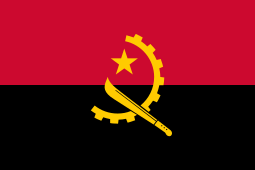Football in Angola
Football is the most popular sport in Angola, followed by basketball.[1] The national team qualified for the 2006 FIFA World Cup in Germany and many Angolan footballers play internationally, particularly in Portugal and France. The top national league is the Girabola.[2] The country was a Portuguese colony since the late 15th century. And so it was the Portuguese who popularized football here. Football in Angola is still shaped by its Portuguese origins and relationships, for example through a number of affiliates of the Portuguese clubs Benfica Lisbon and Sporting Lisbon. Also, many Angolan footballers play internationally, especially in Portugal, but also in France, but mostly in lower leagues.
| Football | |
|---|---|
 | |
| Governing body | Angolan Football Federation |
| National team(s) | men's national team |
Club competitions | |
International competitions | |
Champions League CAF Confederation Cup Super Cup FIFA Club World Cup FIFA World Cup(National Team) African Cup of Nations(National Team) | |
The national football association of Angola is the Federação Angolana de Futebol (FAF). It was founded in 1979, after Angola's independence from Portugal in 1975. The FAF organizes the national football leagues Girabola (1st league) and Gira Angola (2nd league) and is also responsible for the Angolan national team of men and women.
The country hosted the 2010 Africa Cup of Nations.
Club football
League operation
At least since 1965, a national champion is played in Angola in a league operation. Record champion at the Portuguese time was founded in 1953 club Atlético de Luanda, with the championship titles of the years 1965, 66, 67 and 68 In Angola is played since 1979 with the Girabola a top national league, under the Gira Angola a three-track second nationwide League is led. These include the top league of the provincial associations of the 18 provinces of Angola, among which the other regional leagues are played.
Division one
The first division is called Girabola
National team
The national team competed in the FIFA World Cup for the first time in 2006. During qualification, Angola won group 4 over Nigeria, Zimbabwe, Gabon, Algeria and Rwanda. The team was placed in Group D along with Portugal, Mexico national football team and Iran. They finished with 0 wins, 2 draws and 1 loss, they made 3rd place in the group. They did not advance past group play.[3] On 4 September 2006, the African Football Association CAF announced that the Africa Cup 2010 will be awarded to Angola. An extra four new stadiums have been built for the African Championship: the 50,000-seat Estádio 11 de Novembro in Luanda, the 35,000-seat Estádio Nacional de Ombaka in Benguela and the Estádio Nacional de Chiazi in Cabinda and the Estádio Nacional da Tundavala in Lubango, respectively Accommodate 20,000 spectators.
In the group draw Mali, Algeria and Malawi were assigned to Group A. Angola was set as the host group head of this group.
Women's football
Women's football in Angola is generally suffering from lack of attention, including through association and clubs. As a result, there are hardly any multi-faceted league structures, and due to the lack of youth classes, it is not uncommon for 12-year-old girls and almost 40-year-old women to meet in one game. There is a lack of footballing training opportunities for women, so that an aging and thus an end to women's football in Angola threatens.
Organized games of women's football teams have been known in Angola since 1993, and since 1995, Campeonato Provincial de Luanda has had a league operation in Angola, limited to the province of Luanda. The first national women's club championship took place in 1997, as a tournament in the city of Lubango. The title went to the Blocos FC from the capital Luanda. Since 2005, a regular championship has been organized by the FAF. The championship champion of the Luanda provincial championship, the Progresso do Sambizanga, has dominated the nationwide women's football Angola with five nationwide titles since then. In addition to Progresso, the club Amigas dos Mártires de Kifangondo Luanda is one of the strongest teams, so with the ultimately unsuccessful appearance at the national championship tournament in Luena in 2008. [2] The only other competitive teams are Regedoria FC de Viana from Viana and the Clube Desportivo da Terra Nova. Terra Nova is the only club with a second team and a football school for young women. In addition to these four clubs remain the other clubs lack of structures and talented players usually have no chance.
All in all, championships are held in only three Angolan provinces: in the province of Cunene, in the province of Huíla, and especially in the province of Luanda. Occasionally tournaments also take place or took place in the other provinces, especially in the provinces of Bié, Benguela and Cabinda.
The national championship (Campeonato Nacional) has always been played in each case in a central tournament, but not aligned every year. Since 2011, no master has been played. The following national championships have been played in women's football Angola so far
Women's national team
The women's national team Angola has been unable to qualify for any World Cup and no Olympic tournament. At the African Championships she has been able to participate four times. The greatest success is the achievement of the semi-finals at the 1995 Africa Cup of Women.
References
- Jackson, Jamie (10 June 2006). "Angola's golden goals". Retrieved 23 September 2016 – via The Guardian.
- "BBC Sport - Football - Nations Cup stadiums standing idle in Angola". Retrieved 23 September 2016.
- "Iran 1–1 Angola". BBC. 21 June 2006. Retrieved 4 August 2013.